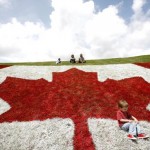Getting Ready for Canada's 150th Birthday
 Maybe it's a good time for Canada to think a little ahead and start planning for the 150th anniversary of Confederation.
Maybe it's a good time for Canada to think a little ahead and start planning for the 150th anniversary of Confederation.
Canada Day 2010 finds Canadians in a rare mood of self-confidence. The country has suffered less from the global recession than any other major economy. No region is threatening to separate. Canadian forces in Afghanistan have distinguished themselves in both combat and humanitarian missions. So maybe it's a good time to think a little ahead and start planning for the 150th anniversary of Confederation, July 1, 2017.
Canadians of a certain age still remember the glory and drama of the 1967 Centennial: the World Expo in Montreal, the gardens planted in cities big and small -- and the amazing insult issued by the visiting French president Charles de Gaulle, who shouted "Vive le Quebec libre!" to a cheering throng in Montreal. De Gaulle might have remembered that there had never been a moment since 1867 when Quebecers did not live in freedom -- and that when it was French freedom that was lost, Canada had contributed more than shouted slogans to France's liberation.
How to top that? World expos feel out of date in this era of cheap international travel. Canadians can visit China for not a lot more than it would cost to visit the China pavilion at an expo across the country. What to do instead?
Four suggestions that update some of the best successes of 40 years ago.
- All over Canada, roads and bridges carry the logo of the 1967 Centennial. Canada could commit to an equally grand 21st-century e-infrastructure project: free wireless Internet access in every major Canadian city centre and every large shopping mall by July 1, 2017. The country of Estonia has made broadband wireless access available in virtually every square meter of national territory: the beach, the woods, buses, everywhere. Canada is too big for that, obviously. But it can at least approximate this kind of coverage where most Canadians spend most of their time.
- Canada's central cities and small towns are beautified by the flower gardens planted for the Centennial. For the 150th anniversary, that beautification project could be extended to the places where Canadians live now: the suburbs and exurbs developed and expanded since 1967. Identify the 100 places where the population has grown fastest over the past half century, and then invite landscape artists from all over the world to submit proposals to improve parks, woods and conservation areas in and near these newly-built areas.
- Canada's newly-built places are often homes to new Canadians. These areas carry too little memory of Canadian history and Canadian accomplishment. Public memorials, statues and other reminders of the Canadian past are crowded into older central cities. As things stand, the Surreys and the Woodbridges could be any suburbs anywhere. They too need their connections to the shared national story -- a story their residents have volunteered to join. As with the landscaping projects, there could be a contest to build 100 historical monuments in the country's 100 fastest growing urban zones: their own memorials to Canada's wars, to the expansion of democracy and human rights, and to both proud and tragic moments in Canadian history.
- Create memorials in the mind as well as on the ground. Invite high school and university students to write essays about Canadian history and then award the best authors prizes to visit the places where that history was made: the settlements of the first aboriginal inhabitants of Canada, the waterways by which Canada was explored, the route of the Canadian Pacific Railway, the worldwide battlefields on which Canadians fought and died. Teach a new generation, many of them first generation Canadians, that Canada is more than a place to earn a living, more than a guarantee of certain social benefits and certain legal rights. It is a national community, always being made new -- and yet connected to its most ancient foundations by human memory and commitment.
Originally published in the National Post.